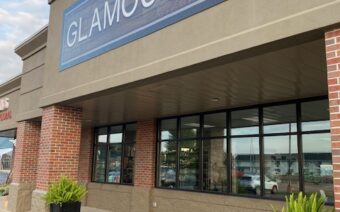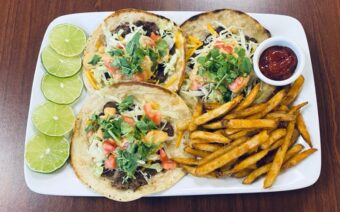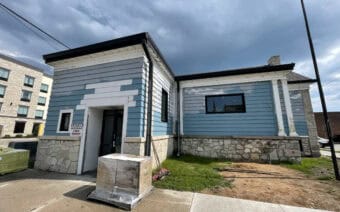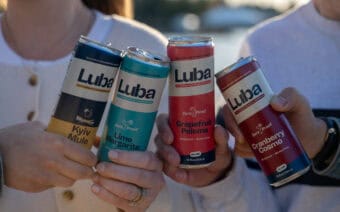
March 10, 2023
CHILTON – From growing up on a farm near a major city in Honduras to attending college in Louisiana, Marko Sosa has had quite the journey on his way to settling in the Town of Chilton.
Marko had a simple response when asked why he and his wife Melissa chose Chilton – a small town of about 4,000 in Calumet County – to live.
“Cows,” he laughed. “I have an agricultural background, and my wife is a teacher. I told her she could pick where we lived when she found a job – she found a job in Chilton. We’ve never regretted the decision. I like the small-town feel.”
The Sosas own and operate two businesses in Chilton – Terra Verde Coffeehouse and Roastery (507 N. Madison St.) and Scoops Ice Cream House (131 E. Chestnut St.).
“Even though they are two separate businesses, they are both under Terra Verde’s name,” Marko said. “We started the coffeehouse in 2007 and acquired the ice cream shop in 2016.”
Why a coffeehouse?
Marko said the southern part of the United States – particularly Louisiana where his wife grew up – has a large coffee culture.
“When we moved to Chilton, we couldn’t find a place to get a good cup of coffee,” he said. “We always had to go to the Fox Valley or Green Bay. One morning when I dropped my kids off at daycare, a woman was there sipping on a latte. I found out she traveled 10 miles daily roundtrip to get her latte.”
Marko said that led to the next step in his coffee journey.
“I canceled all my appointments for the day and began looking around town for a place to open a shop,” he said. “I figured if a lady in Chilton was willing to drive 10 miles roundtrip to get a latte, she’d probably get one in town if there was a coffeehouse.”
Marko said in 2007, there was a lot of change in Chilton.
“We got a Walmart and there was a lot of movement in businesses,” he said. “The building we are currently in for the coffeehouse used to be a Subway. I went to the grocery store next door and saw this building was empty in March 2007. I called the number on the building, and after checking to make sure we didn’t have any other coffee competitors in town, the rest is history. We opened the doors to Terra Verde a few months later in August.”

Terra Verde Coffeehouse and Roastery owner Marko Sosa monitors the roasting of coffee beans. Terra Verde does all of its roasting in-house. Rich Palzewic Photo
There was only one problem with opening a business in 2007.
“That was the start of the recession,” Marko said. “One thing I found out, though, was that coffee is very resilient in a recession. We did okay and survived, but it was a scary time to start – we got great support from the community.”
Marko said the same thing can be said for navigating through the COVID-19 pandemic.
“Coffee and ice cream are resilient during a pandemic,” he said.
In 2009, Marko said Terra Verde began roasting its coffee beans in-house.
“Then in 2010, we started selling our coffee wholesale – now we have more than 50 we work with,” he said. “Our wholesale business has grown every year since. We sell locally and mostly in the Midwest, but we also sell online.”
Marko said Terra Verde has sold in every state in the country besides Alaska.
“Surprisingly, we have a regular customer from Hawaii – they have awesome coffee there, but they must like our coffee,” he said.
Marko said since the two businesses are stable and they have enough help, his wife is back to teaching – for now.
“I run the day-to-day operations, whereas my wife teaches and helps when she can,” he said. “But we are in the process of expanding, so we’ll see what the future holds.”
Marko said if the couple can secure funding and tie up loose ends, the coffeehouse and ice cream shop will all be under one roof – hopefully, at the very latest, by sometime in 2024 – in a newly constructed building.
“We’ll have enough space for everything,” he said. “Right now, it’s a logistical nightmare with having enough storage. It’s been working, but it’s also been limiting. We’ll have enough room for all the coffee and enough freezer space for the ice cream – it’ll be much more efficient.”
The art of coffee
Marko said Terra Verde sources its coffee from about nine different countries all over the world.
“Indonesia, countries in Africa, Central America and South America are used,” he said. “We have selected all of our coffees carefully because we want to serve a quality cup.”
Marko said because he grew up in Honduras, a country of about 9.5 million located in Central America south of Mexico, he knows a thing or two about coffee.
“I believe Honduras is in the top three or four coffee producers in the world,” he said. “It’s a high-quality coffee.”
Marko said the coffee they receive at Terra Verde must follow three criteria:
It has to be certified organic.It has to grade a minimum of 86 on the Specialty Coffee Association of America grading scale.It has to come from a producer, co-op or organization that has a social, economic and environmental impact in the immediate area where it’s produced.
“It’s our ethical mission to follow these guidelines to be a responsible company,” he said.
Impact in Honduras
Marko said Terra Verde works with a “very special co-op in Honduras.”
“It’s special because the co-op is made up entirely of women,” he said. “Additionally, the women are rescued from domestic violence abuse. The women are put in a safe place, and once they are better and free, they are offered to be a part of the co-op.”
From there, Marko said the women are offered an income base.
“They might work in the aloe industry – which is also big in Honduras – or grow coffee for the co-op,” he said. “It helps the women get back on their feet. It’s much easier for us to return to Honduras because I still have family there. Every time we go there, we teach them coffee education to help them improve their techniques.”
Other community impacts
Marko said many of the things they do for the community through Terra Verde align with their overall beliefs.
“We want to be good stewards of the land and be a part of improving the environment,” he said. “We work with many of the nature centers in the area. Any fundraisers they have, we provide coffee and ice cream free of charge – it’s part of our DNA.”
Marko said because his wife works in the school system, that’s another area they work heavily in.
“We work with many children’s organizations in town,” he said. “The big one we work with is ‘Shop With a Cop.’ Every summer, it’s like Christmas in July – we help them fundraise.”

Terra Verde Coffeehouse and Roastery owner Marko Sosa, left, said his shop helps with “Shop With a Cop” every summer – an opportunity to give back to the local community. Submitted Photo
Marko said they also work with the script program – which gives back a portion of money to organizations through gift cards.
“It’s through churches and schools,” he said.
Marko said each year, Terra Verde also hosts four blood drives at the ice cream shop.
“We call it, ‘Give a Pint, Get a Pint,’” he said. “Every person who donates a pint of blood gets a pint of ice cream. It’s become very popular and successful. We give out about 60 pints of ice cream per blood drive.”
Journey to the United States
Marko said his journey to the United States was anything but ordinary.
“We had the farm, so most of the time I spent there,” he said. “I like the spread and don’t like neighbors two feet away. We never had to worry about locking our doors.”
Marko said it’s very much the same in Chilton.
“It’s safe for kids,” he said. “The city near the farm had a population of about 1.5 million. Bigger cities have their advantages with amenities, but nothing tops a small town when it comes to safety.”
After graduating from an agriculture college in Honduras in 1995, Marko moved to Louisiana to attend Louisiana State University (LSU).
“I got another bachelor’s degree at LSU,” he said. “Around that same time, Hurricane Mitch hit Honduras and devastated the farm. It hit about 30 miles from there. My dad called me and said, ‘Marko, there’s no use in coming back home. You can if you want to, but it’s going to be an uphill battle.’ We had perennial trees that took 15-20 years to mature that were gone. He told me to start my own life in the United States.”
Marko said after the hurricane, Honduras also changed politically.
“It got bad down there,” he said. “I was married to an American woman, and now we had (three) kids, so to try and go back and have them assimilate in Honduras wasn’t a good idea. It’s one thing to vacation in Honduras and enjoy the country, but it’s another thing to make a living there.”
 Appleton International Airport expansion on schedule for 2025 NFL Draft
Appleton International Airport expansion on schedule for 2025 NFL Draft ‘It’s never too late to follow your dreams’
‘It’s never too late to follow your dreams’








